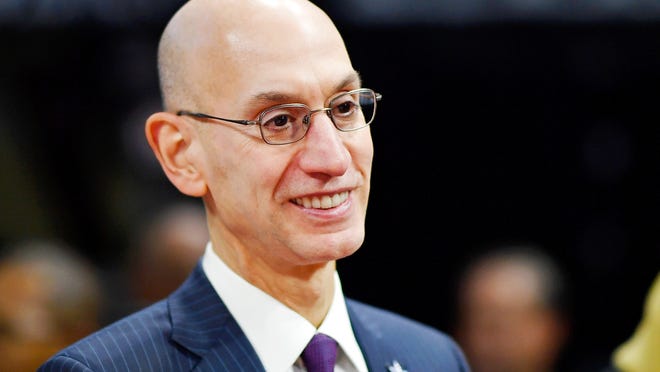Opinion: NBA needs to permanently abolish marijuana testing
No more than five players have been suspended for violating the NBA’s and National Basketball Players Association’s marijuana policy in the past four seasons.
The issue isn’t if NBA players do or don’t use marijuana. It’s just that players don’t have serious issues with violating the policy.
After not conducting random testing for marijuana to finish the 2019-20 season inside the bubble near Orlando, Florida, the league is not doing random testing for marijuana this season.
It’s time the NBA and NPBA permanently altered their policy on marijuana and stopped penalizing players for using it.
NBPA executive director Michele Roberts told GQ before the season started she anticipates random testing for marijuana will be eliminated “in the next CBA, maybe even next season.”
Not only is adult-use marijuana legal in 11 states and one country (Canada) where 14 NBA teams play, it is nearing legal use in New Jersey, providing easy access to three more NBA teams. Marijuana is available for medicinal purposes in eight other states, making it possible to get marijuana legally in two-thirds of jurisdictions where NBA teams play.
The NBA, meanwhile, enters a player into its marijuana program after the first violation, a $25,000 fine on the second violation and a five-game suspension without pay on the third violation. For each subsequent violation after the third time, the player is suspended five games longer than the previous violation.
This issue in the NBA is negotiated between the league and its players, and NBA Commissioner Adam Silver hedged on the idea of removing the substance permanently from its anti-drug policy.
“When it comes to penalties around drug use, it’s really more of an indication of a failure,” Silver said. “We never hope that we have to impose any sort of discipline for substance abuse, and they’re there by collective agreement with the players that this is something these rules we believe make for a better league.
“Now, I recognize that society’s views around marijuana use have changed dramatically since these rules were put in place, and in many ways, the suspension of random testing this season is a recognition of that.”
For years, neither the NBA nor the NBPA moved to change the rule even though marijuana laws and attitudes toward marijuana have shifted in the past decade.
It just wasn’t an issue that rose to the top of CBA discussions. The two sides didn’t make the anti-marijuana policy a focus when they negotiated the 2017 collective bargaining agreement. A person familiar with negotiations told USA TODAY Sports the players union didn’t push the issue at the time because players weren’t getting suspended at a rate that required a fresh look at the policy.
The person requested anonymity because he was not authorized to speak publicly about the negotiations.
But since the last CBA was ratified, more states have adopted adult-use marijuana laws and more states and the federal government are looking into more progressive laws. Three Democratic senators, led by Senate Majority Leader Chuck Schumer, announced on Tuesday plans to introduce legislation that will end the federal prohibition on marijuana.
Truth is, the NBA – known for its progressive approach on many issues – lags behind other North American pro sports leagues.
The NHL tests for marijuana but doesn’t punish for positive tests and instead uses a treatment-based program if necessary.
The NFL also tests for marijuana, but it increased the amount of nanograms it measures for, and a positive test doesn’t register an automatic suspension. A medical panel reviews each case to determine if treatment is necessary.
MLB removed cannabis, THC and cannabinoids from its drugs of abuse program. “Marijuana-related conduct will be treated the same as alcohol-related conduct under the Parties’ Joint Treatment Program,” according to the league and MLB players union.

There are ways under those agreements to punish players if they don’t adhere to recommendations.
Silver listed his concerns when asked by USA TODAY Sports at his season-opening press conference in December.




